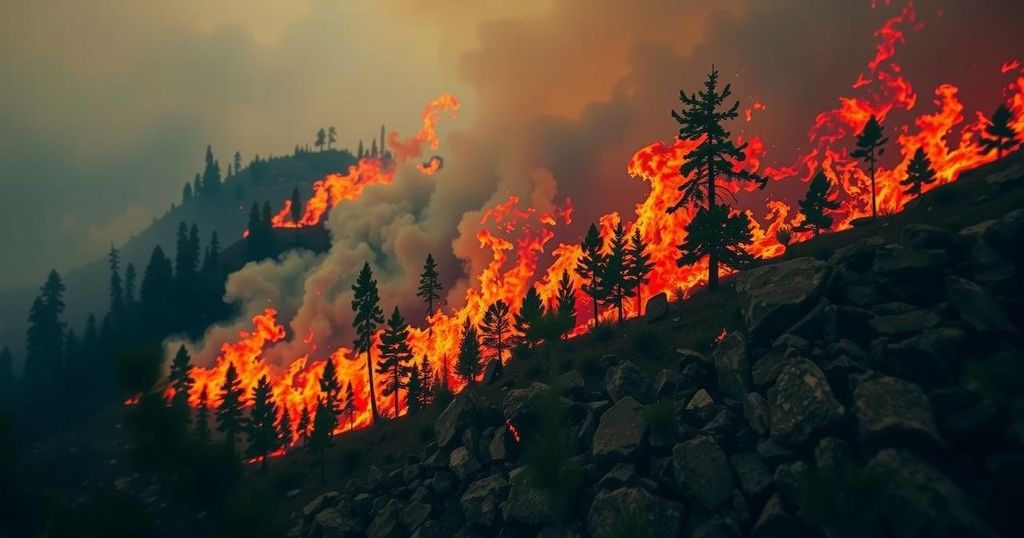Climate Change Linked to Rising Wildfires and Increased Smoke-Related Deaths

Recent research indicates a strong link between climate change and rising global wildfires, which has resulted in significantly increased smoke-related deaths. Studies reveal that while human activities can reduce fire spread in some regions, climate change’s influence increasingly overshadows these efforts, particularly in fire-prone areas experiencing extreme weather conditions.
Research has established a strong correlation between climate change and the rising frequency and intensity of wildfires globally, which has also resulted in a significant increase in smoke-related deaths over recent decades. Two studies conducted by research teams from Dalhousie University, Belgium, the UK, and Japan investigated the prevalence of wildfires and their impacts on human health, revealing deteriorating conditions in both areas. The data indicates that approximately 669 deaths attributed to wildfire smoke occurred annually in the 1960s; however, this number escalated to 12,566 annually by the 2010s. One of the studies, published in the journal “Nature Climate Change,” compared wildfire modeling with and without climate change influences, discovering an uptick in wildfires’ occurrence and intensity in various regions, particularly sensitive ecosystems in Africa, Australia, and Siberia. Interestingly, the findings exhibited considerable regional disparities. For instance, Africa, housing up to 70 percent of the global burnt area, has seen a decrease in wildfires primarily due to increased human activity and land fragmentation, hindering fire propagation. In contrast, regions such as California and Siberia are experiencing more fires, driven by prolonged droughts and elevated temperatures linked to climate change. Dr. Sian Kou-Giesbrecht, an Associate Professor at Dalhousie University’s Department of Earth and Environmental Sciences, noted, “The study is important because it shows and quantifies the influence of climate change on increasing wildfires worldwide, especially given the impacts of wildfire on society and its feedback to climate change.” The research utilized models that factored in various elements, including climate variations, vegetation types, and population density. The researchers emphasized that while human interventions like fire suppression and landscape management can mitigate wildfire occurrences, these measures are often insufficient against the overwhelming effects of climate change, particularly during extreme weather conditions. Seppe Lampe, a climate scientist at the Vrije Universiteit Brussel, remarked, “What is striking is that in periods with low to moderate numbers of fires, direct human interventions have a large effect. However, in periods with many fires, the effect of climate change dominates, meaning that in these cases we lose control.” The simulations indicated that climate change augmented the global burned area by nearly 16 percent from 2003 to 2019 and raised the probability of experiencing above-average global burned area months by 22 percent. It was reported that the contribution of climate change to burned areas increased by 0.22 percent annually on a global scale, with Central Australia witnessing the most substantial rise. A separate paper, also published recently, indicated that climate change may have increased wildfire smoke-related deaths by a factor of ten over roughly fifty years, a phenomenon that had remained largely unmeasured. Researchers combined fire-vegetation models with a chemical transport model and health risk assessment framework to ascertain global human mortality from fine particulate matter emissions due to wildfires, attributing substantial mortality to climate change between 1960 and 2019. They found that one to three percent of fire deaths in the 1960s could be linked to climate change, whereas this figure rose to as much as 28 percent in the 2010s. According to Dr. Kou-Giesbrecht, “It can be tricky to attribute wildfire to climate change because of the complexities of the interactions between fire weather, global change effects on potential fuel, land management and ignitions, but in these international projects we have made a robust attribution of wildfires to climate change using multiple models.” If the current rate of climate change persists, there will likely be a significant rise in the area burned and corresponding health implications in upcoming decades.
The article discusses the global phenomenon of increasing wildfires, which have been directly linked to climate change, a situation exacerbated by associated human health impacts. It summarizes findings from two significant studies that analyze the trends of wildfires, their relationship with climate change, and the consequent rise in smoke-related fatalities. The research highlights major regional variations in wildfire prevalence and connects these changes to human activities and climate conditions.
In conclusion, the studies extensively highlight that climate change plays a dominant role in exacerbating the frequency and intensity of wildfires worldwide, leading to a dramatic increase in wildfire smoke-related health issues over the decades. While human interventions can mitigate wildfires under certain conditions, they are insufficient to counteract the robust effects of climate change, particularly during extreme weather events. The evidence calls for urgent and sustained efforts in both greenhouse gas emission reductions and effective fire management strategies to protect lives, livelihoods, and ecosystems.
Original Source: www.dal.ca







